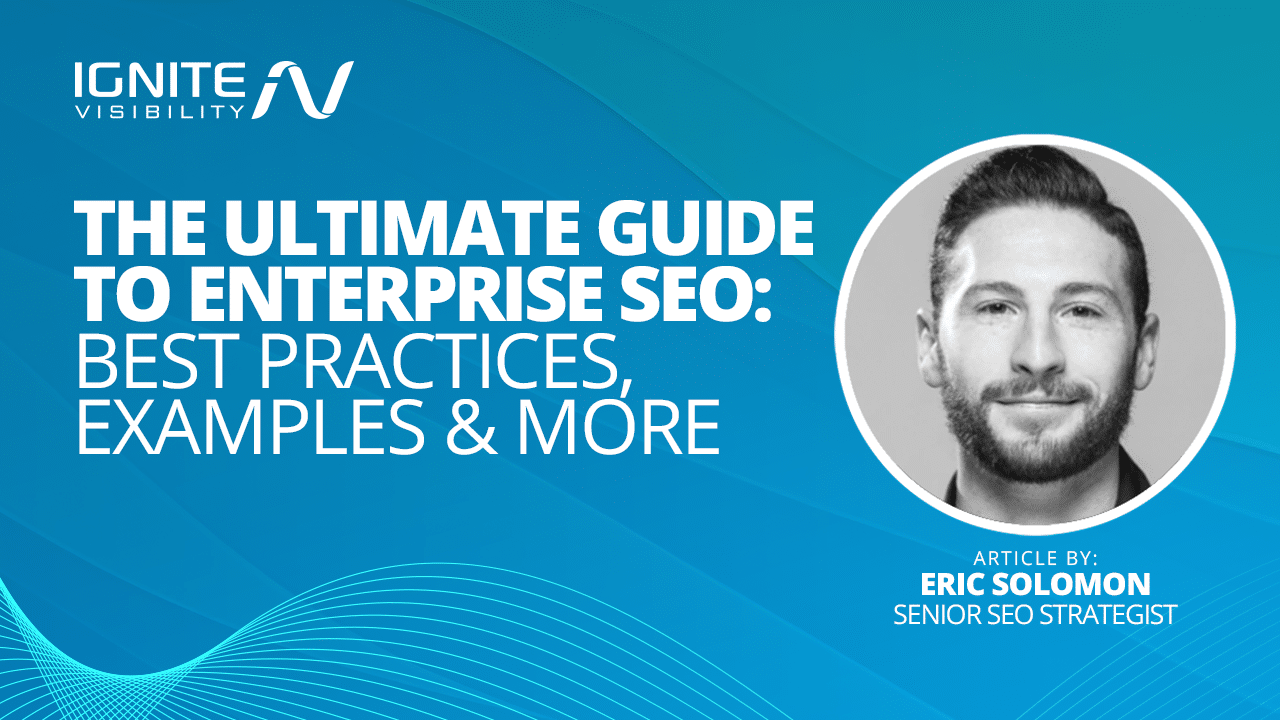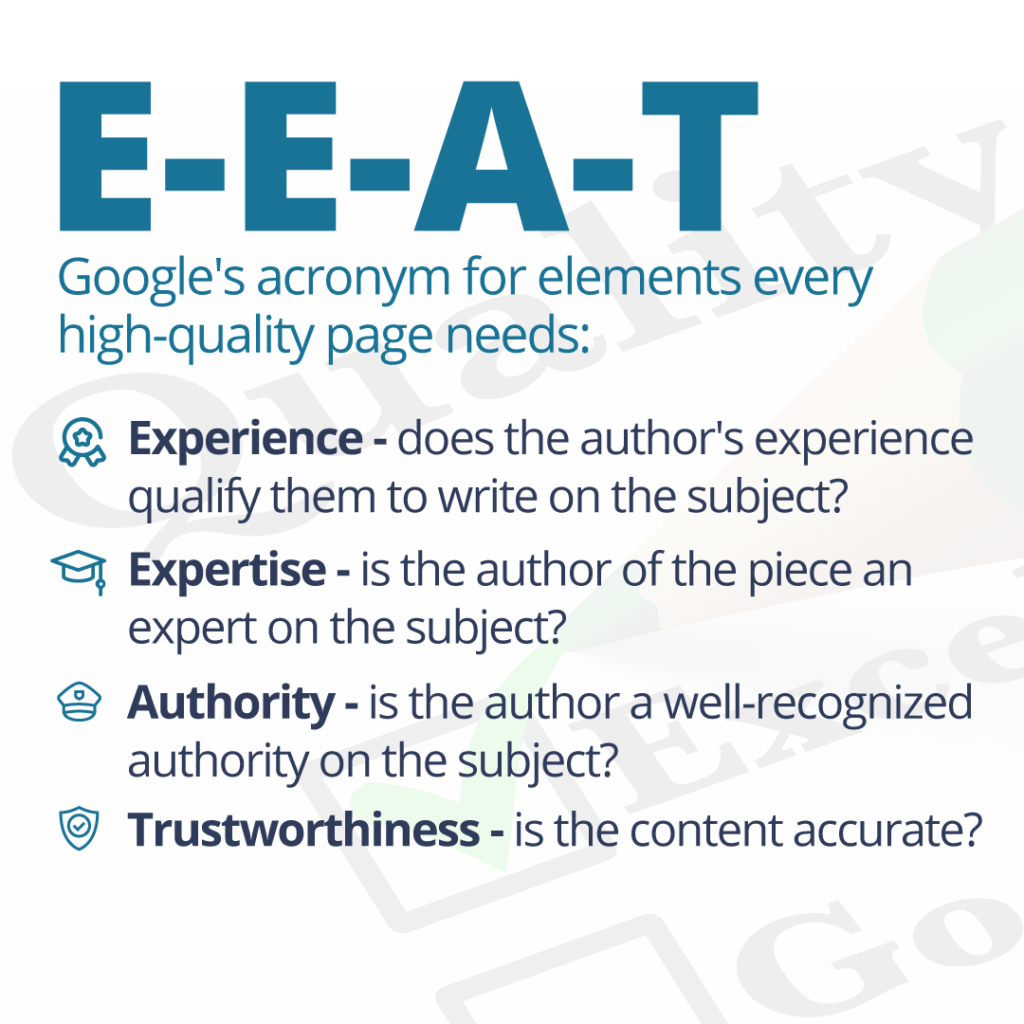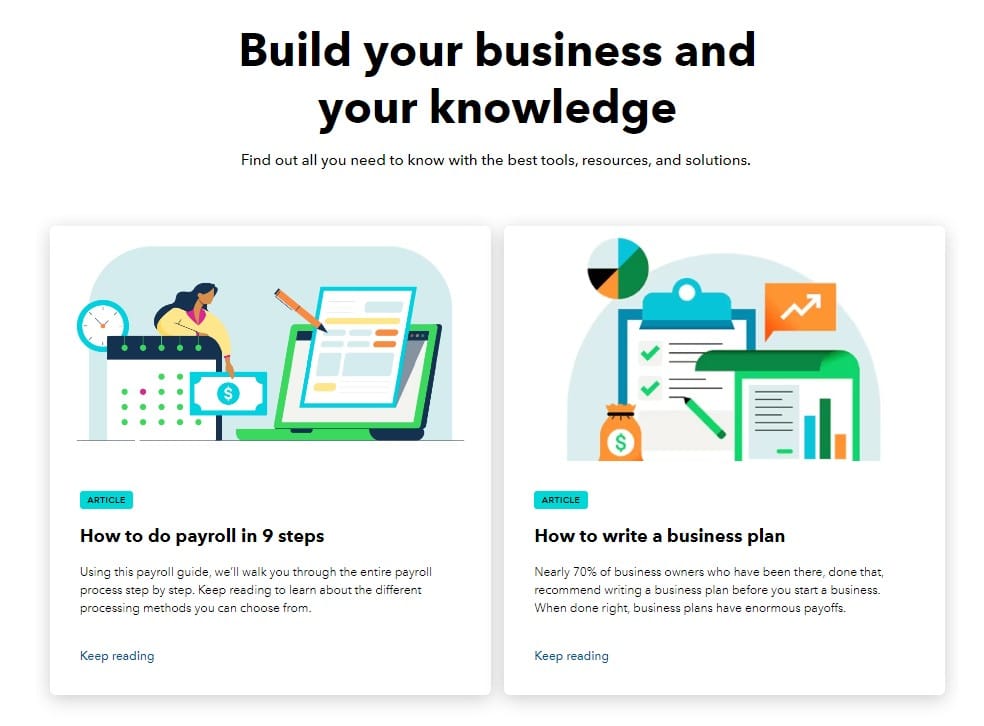
Search engine optimization (SEO) is crucial for any business looking to establish a strong online presence and drive organic traffic to their website. For large organizations, the stakes are even higher.
In this guide, Senior SEO Strategist Eric Solomon will explore the world of enterprise SEO management, its unique challenges, best practices, and how it can impact your business.
What You’ll Learn
- Understanding Enterprise SEO
- 6 Key Components of a Successful Enterprise SEO Strategy
- Enterprise SEO Best Practices
- Success Stories – Enterprise SEO Examples
- Common Mistakes in Enterprise SEO
- Future Trends to Watch For
- Enterprise SEO Tools to Try
- FAQs About Enterprise SEO
My Expert Insight on Enterprise SEO
Enterprise SEO is not just about optimizing web pages; it’s about creating a cohesive strategy that aligns with the overall business goals.
Enterprise SEO solutions are strategic, involving more than fine-tuning keywords or meta tags. Instead, the idea is to focus on crafting a holistic approach that incorporates SEO seamlessly into wider business objectives.
Action Item: Schedule a meeting with key stakeholders to discuss how you can align your SEO efforts with the overarching business goals and implement a comprehensive strategy tailored to your organization’s needs and objectives.

Eric Solomon Expert Quote – Enterprise SEO
Understanding Enterprise SEO
Enterprise SEO is the art of optimizing large websites with hundreds to millions of pages to rank higher on search engines like Google. Unlike traditional SEO, which focuses on smaller websites, enterprise SEO requires a more complex and strategic approach to address the scale and scope of large enterprise sites.
Examples of sites that might need enterprise-level SEO include:
- Fortune 500 companies
- Large ecommerce sites with 10,000+ pages
- Businesses with multiple locations
- Enterprises with several websites
To execute enterprise SEO successfully, a higher level of orchestration, advanced skills, and project management are required. When applied effectively, these principles can lead to significant returns for the organization.
Why Enterprise SEO?
A robust enterprise SEO strategy can drive organic traffic, improve brand visibility, and ultimately lead to higher conversions and revenue.
In recent years, enterprise SEO has grown and evolved, thanks to major advancements in technology and changes in search engine algorithms. Today, enterprise SEO is more data-driven, focusing on user experience, quality of written content, and technical optimization.
Enterprise SEO Challenges
However, enterprise SEO comes with its own set of challenges, including scalability, harmonization across departments, and managing complex websites. In traditional SEO, one or two SEOs can handle all aspects of search optimization. In enterprise SEO, the workload is too large for one or two people to manage successfully, requiring a dedicated SEO team for each aspect of search optimization.
Communication also plays a role in enterprise SEO, not only within the SEO team but across departments. The success of search optimization efforts depends on how well your development, marketing, IT, and design teams understand the value of SEO and work together toward achieving a common goal.
To ensure communication levels are where they should be, an enterprise SEO team needs to establish strict SEO guidelines. These guidelines should help colleagues and C-level managers understand the importance of SEO and explain the rationale behind certain decisions.
In addition, automation is key in enterprise SEO. Saving even a small amount of time per person can result in significant time savings for the entire enterprise.
6 Key Components of a Successful Enterprise SEO Strategy
1. In-Depth Technical SEO
Technical SEO is the backbone of any successful enterprise SEO strategy. It’s about optimizing how your website is built and how search engines crawl and understand it.
Things like site speed, fixing errors that can prevent search engines from properly exploring your site, and making sure it works well on mobile devices all play a significant role.
A good technical SEO strategy not only helps you show up better in search results but also makes it easier for people to use your site.
2. E-E-A-T Optimization
E-E-A-T (Experience, Expertise, Authoritativeness, Trustworthiness) optimization is particularly important for large organizations, especially in industries related to health, finance, and other YMYL (Your Money Your Life) topics.
Demonstrating expertise, authoritativeness, and trustworthiness in your content can significantly impact your credibility and ranking on search engines. This can be achieved by posting high-quality content that is accurate and well-researched.

E-E-A-T
3. Scale Your Content Strategy
Managing lots of content can be tough for big organizations. A good content strategy involves reviewing your content and refining your process to give users a consistent, top-notch experience.
Regularly checking your content and filling any gaps can make the user journey more unified and engaging.
4. Domain Authority and Trust
Building up your authority online is incredibly important, especially in enterprise SEO. That means getting quality backlinks, mentions from other brands, and forging partnerships to ensure your website is more trustworthy.
When your website is seen as a reliable source in your industry, it can boost your rankings on search engines and bring in more people naturally.
5. User Experience (UX) and SEO
The experience users have on your site is a big deal for SEO, especially if you’ve got a big website. Making your site fast, easy to use on mobile, and ensuring a smooth journey for visitors can make them happier and boost your rankings on search engines.
6. Data and Analytics
To succeed with your enterprise SEO, you’ve got to lean on data. By digging into things like user behavior, where your traffic is coming from, and how well your keywords are performing, you can update your approach.
Enterprise SEO Best Practices
Now that we understand the significance of enterprise SEO, let’s delve into some of the advanced strategies necessary for larger companies.
Integrating with Overall Marketing Strategy
It’s all about syncing up your SEO strategy with your broader marketing goals. Your SEO efforts should mesh seamlessly with your other marketing moves to pack a punch.
By weaving SEO into your overall marketing game plan, you can make sure your brand message is consistent across all channels. Leverage SEO insights to inform every aspect of your marketing efforts, from content creation to social media campaigns and beyond.
Integrate SEO data into your broader marketing analytics, to gain valuable insights into consumer behavior, preferences, and trends, allowing you to tailor your messaging and outreach strategies, reaching your target audience at every stage of the buyer’s journey.
SEO Governance
Think of implementing SEO governance as laying down some guardrails to uphold SEO standards across your organization. It involves providing training, guidelines, and regular check-ins to ensure everyone is following best practices and creating a culture of accountability.
Through systematic monitoring and evaluation, you can identify opportunities for optimization, refine strategies, and ultimately enhance the effectiveness of your SEO efforts in driving sustainable growth and maximizing online visibility to ensure alignment with your business goals.
Cross-Department Collaboration
Collaboration among SEO, content, IT, and other departments is crucial for a successful enterprise SEO strategy.
This collaboration also uncovers opportunities for synergy between departments, such as leveraging marketing content to enhance SEO or collaborating with IT to address technical issues impacting SEO. In doing so, encourage sharing insights, resources, and expertise so each department can contribute its unique perspectives.
Fostering a culture of collaboration ensures everyone works toward common objectives and integrates the SEO strategy seamlessly into your organization’s goals.
Enterprise SEO Success Stories
Real-world examples of successful enterprise SEO strategies can provide valuable insights into how other organizations have overcome challenges and achieved success.
Salesforce
Take Salesforce, for example. As a leading CRM platform, they manage a whopping 58,900 pages on their site, streamlining operations with a content management platform for bulk functions.
They kick-started their journey with a thorough enterprise website SEO audit, fixing technical glitches and earning relevant backlinks.
Salesforce now dominates Google’s first page for nearly 73,701 keywords, which has led to their website traffic to a staggering one million within one year.

Salesforce First Page Keywords in Google SERPS
Shopify
Then there’s Shopify, a powerhouse in ecommerce. Their SEO playbook revolves around establishing domain authority, pinpointing lucrative keywords, and crafting a robust link-building strategy.
They excel in ranking for “drop shipping” keywords and their variations, cleverly generating both external and internal links.

Organic Search Positions for “Drop Shipping” Keywords for Shopify
With a meticulous five-step SEO integration method, Shopify creates tailored landing pages for app partners, infusing them with the right mix of keywords and glowing customer reviews.
Intuit
Lastly, let’s look at Intuit, a global financial platform. Facing a content challenge, they bravely axed 2,000 outdated blog posts, making up a whopping 40% of their content. But it wasn’t a cut-and-dry decision.
By replacing the old with fresh, high-quality content, Intuit witnessed a remarkable 20% surge in overall organic traffic, soaring to a 44% spike during the tax season frenzy. This surge also resulted in a 72% increase in sign-ups.

Current Intuit Blog Posts
Common Mistakes in Enterprise SEO
Discussing common pitfalls in enterprise SEO and how to avoid them can help organizations avoid costly mistakes and improve their SEO performance.
- Unclear Goals: Set clear and specific goals for your SEO strategy, whether it’s to increase traffic, generate leads, or boost sales. Divide your goals and focus on them one at a time to prevent confusion and wasted efforts.
- Skipping SEO Audits: Conduct regular SEO audits to identify areas for improvement, such as technical optimization, content quality, and user experience. Addressing these issues can boost your website’s position in search engine results.
- Ignoring Duplicate Content: Duplicate content can cause indexing issues with search engines. Use canonical tags to indicate the main version of a page and avoid duplicate content penalties.

What is Duplicate Content?
- Neglecting Title and Meta Description: Craft unique and descriptive titles and meta descriptions for each page to attract clicks and improve search engine visibility.
- Prioritizing Over-Expansion: Focus on optimizing existing content and pages before creating new ones. Updating and optimizing older pages can improve their chances of ranking and prevent website bloat.
- Not Optimizing Channels: Use multiple channels, including SEO, paid search, and social media, to scale your marketing efforts effectively. An omnichannel strategy can help retain customers and maximize brand visibility.
Future Trends in Enterprise SEO
Looking ahead, enterprise SEO will see a ton of exciting changes driven by up-and-coming tech. Let’s explore a few:
- Augmented Reality (AR): Integrating AR into your SEO plans will open new possibilities for immersive experiences which will revolutionize how users engage with brands and search for information.
- Natural Language Processing (NLP) and Natural Language Generation (NLG): Search engine algorithms are being reshaped as their understanding of content and keywords change. These algorithms are continuing to prioritize content creation and optimization that put relevance and context first.
- Voice Search and User Experience (UX): With voice search continuing to grow in popularity, it’s essential to pay attention to the experience you’re providing users. Optimize your content for conversational queries to rank higher in search and create seamless interactions in the future.
For enterprises to thrive, staying agile and keeping up to date with these trends will be non-negotiable.
Enterprise SEO Tools To Try
Finding the right tools for your enterprise SEO strategy can seem overwhelming, especially when you’re gearing up to serve large corporate clients. Fortunately, these tools make tasks such as keyword research, competitive analysis, website audits, and content optimization much easier.
Google Analytics
For those just starting or hesitant to invest, Google Analytics is a free tool that tracks website traffic and performance and delivers a range of audience overview and demographics reports. However, mastering Google Analytics takes time and expertise to analyze its various reports effectively. You’ll get access to customer insights to help improve your ROI, connect your insights to results, and then make your data work for you.

Customer Testimonial – Cutting Reporting Time
HubSpot’s Website Grader
This free tool evaluates your website and provides suggestions for SEO improvements. HubSpot’s Website Grader also helps enhance website performance, optimize for mobile, personalize experiences, and implement SEO best practices. You’ll get your website rating in seconds, with a breakdown of performance, SEO, mobile, security, and more.

Example of HubSpot’s Website Grader
Moz Pro
Moz Pro helps you target the right keywords to create custom support. This tool helps remove the SEO complexity by understanding your visitors, tracking your rankings, crawling and auditing your site, helping you optimize your pages, and identifying unique link-building opportunities.
With tiered plans, Moz Pro offers pricing ranging from $99/month for the most standard plan to $599/month for the premium plan. There’s an option to pay yearly to save 20% as well.

Moz Pro Pricing Plans
Ahrefs
Another all-in-one toolkit, Ahrefs is similar to Moz Pro and stands out for its extensive backlink database, which is helpful for link-building and competitive analysis. This tool will also help you audit and optimize your website, track your ranking progress, and give you new content ideas. Ahrefs runs its search engine, providing high-end infrastructure to power all its services.
With a free option, you’ll have access to the Site Explorer and Site Audit tools. Monthly plans begin with the Lite version, starting at $99/month, and leading up to the Enterprise custom plan, available on annual contracts only.

Ahrefs Pricing Guide
Enterprise SEO FAQs
1. What are the benefits of enterprise SEO?
Enterprise SEO can give you the same benefits as regular SEO, plus the ability to automate many tasks. As your website scales, your SEO team will be able to keep up.
2. How long does it take to see results from enterprise SEO?
It can take days, weeks, or months for enterprise SEO campaigns to work. It all depends on the speed and effectiveness of your strategy and when search engines crawl your site.
3. How do I know if I need enterprise SEO?
If you have a large website that’s likely to expand, you could benefit from enterprise SEO. Good enterprise SEO services can help you scale your site and maintain SEO for up to millions of pages.
Achieve Your Business Goals with Ignite Visibility
Whether you’re looking to streamline marketing processes, outshine competitors, or take your enterprise SEO game to the next level, our team at Ignite Visibility has the solutions you need.
Ignite Visibility can assist you in:
- Monitoring your online reputation and securing valuable links
- Improving your E-E-A-T optimization
- Scaling your content marketing strategy
- And much more!
Excited to get started? Contact us today to learn more about the benefits of enterprise SEO.

